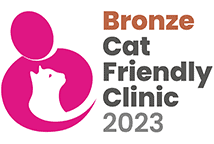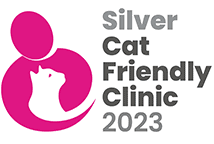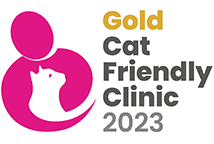Is your pet afraid of fireworks? You are not alone – recent research suggests that almost half of the pets in the U.K. show some level of fearful response to loud noises. Planning ahead can be helpful.
On fireworks night:
Provide a den or hiding place - Animals naturally hide when they are scared and it can help to provide a ‘safe place’ which they can squeeze into, like an understairs cupboard or an indoor kennel with blankets over the top and inside, leaving the door ajar. An ideal place is somewhere near the centre of the house, or somewhere they have previously hidden. Cats will often hide under the bed and emerge once they feel it is safe. Never try to remove your pet from their ‘safe place’ as they may be fearful and this could lead to aggression.
Muffle the sound of fireworks – Close all the curtains, shut outside doors and windows, and have your pet as near to the centre of the house as possible. By closing the curtains you are removing potential additional problems from flashing lights etc. Put on the TV or radio to mask the bangs.
Keep them inside - Don’t let pets outside when fireworks are likely or during a display. Take dogs out for toilet purposes before it gets dark and then keep them in. A firework going off when they are outside can lead to a fear of going out. Make sure your cat is kept in after dark (with access to a litter tray) and ensure all escape routes such as cat flaps are blocked. It is also advisable to have your pets microchipped and ensure their details are up to date in case they do escape and become lost.
Feed your pets before the fireworks start- This can encourage them to rest and hopefully sleep. Giving your dog a stodgy, high carbohydrate meal before the fireworks for example chicken and pasta can help. This will help your dog feel sleepy and less responsive to the noise. Food filled interactive toys to help distract pets are also useful.
Don’t over fuss them - This can be difficult, but if they rely on you for comfort during scary events, they will be less able to cope when you are not at home and make matters worse in the long term.
Stay calm yourself - Most pets can sense when their owners are worried, and this increases their stress. Let them hide in the den or their ‘safe place’, and leave them there until the fireworks have finished and they come out. You can give your pet lots of fuss once they emerge.
Don’t get angry - Although your pets behaviour may be annoying, it is happening because they are scared and getting cross will only make them worse. Don’t try and take your pet out of its hiding place- this increases their stress and could lead to aggression.
Prepare for unusual behaviour - Fear can make your pet behave out of character. For example, if they anticipate that going into the garden predicts a loud noise, they may hide or show aggression to avoid going outside.
Don't forget your small furries during fireworks- If they live outside partially cover cages and pens with blankets to help sound proof them and provide extra bedding for them to burrow into.
Talk to your vet - We can advise short-term measures which may include products like Nutracalm, Zylkene, Adaptil or Feliway. Thundershirts have also been found to help with mild phobias. They exert a gentle pressure mimicking gentle hugging to calm your pet without you comforting them. Sedative medications may be recommended for more severe phobias, particularly if they don’t settle but pace around in distress, shaking and salivating or panting. It is important to help reduce your pets' stress during upcoming firework events and help prevent their fears becoming worse.
Your veterinary surgeon and veterinary nurse can also advise a long-term preventative approach for once the firework season is over. Fear of fireworks does not get better on its own- in fact they are likely to get worse over time and lead to other behavioural problems. The earlier you seek help the better the outcome is likely to be.




